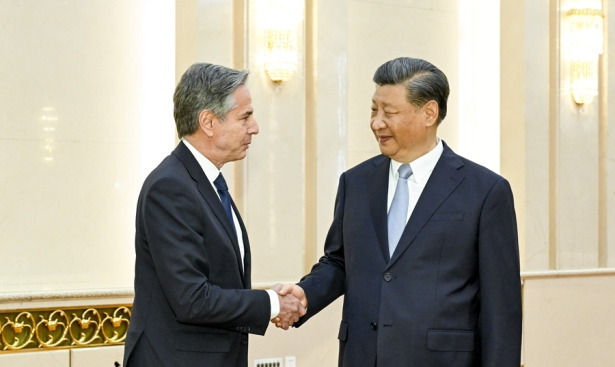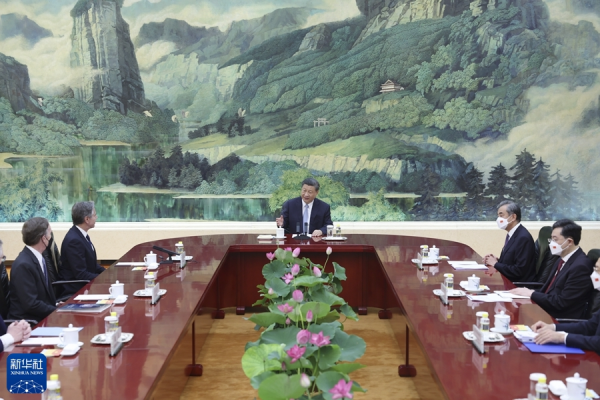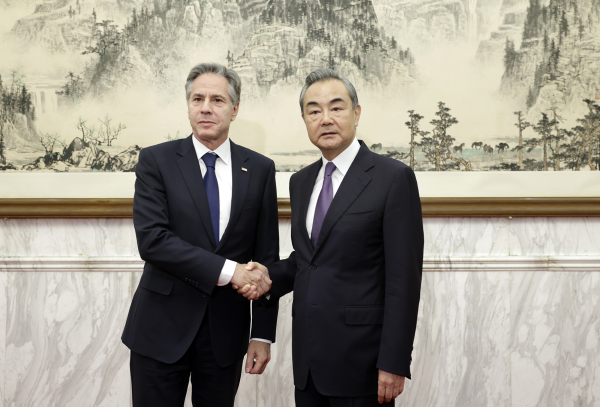
Chinese President Xi Jinping with the United States Secretary of State Antony J Blinken in Beijing today. Photos courtesy Chinese foreign ministry.
Beijing/Washington: Chinese President Xi Jinping today told the visiting United States Secretary of State Antony J Blinken that the US should adopt a “rational and pragmatic” attitude, and work with China in the same direction.
“The international community is generally concerned about the current state of China-U.S. relations. It does not want to see conflict or confrontation between China and the United States or choose sides between the two countries. It expects the two countries to coexist in peace and have friendly and cooperative relations. The two countries should act with a sense of responsibility for history, for the people and for the world, and handle China-U.S. relations properly,” Xi told Blinken.
Xi stressed that major-country competition does not represent the trend of the times, still less can it solve America’s own problems or the challenges facing the world. “China respects US interests and does not seek to challenge or displace the United States,” he said and stressed that the common interests of the two countries should be valued, and their respective success is an opportunity instead of a threat to each other. “The world needs a generally stable China-U.S. relationship. Whether the two countries can find the right way to get along bears on the future and destiny of humanity. Planet Earth is big enough to accommodate the respective development and common prosperity of China and the United States,” he added.
The Chinese President met the visiting US officials in Beijing today afternoon for 35 minutes. Blinken conveyed US President Joe Biden’s greetings to President Xi. “President Biden asked me to travel to Beijing because he believes that the United States and China have an obligation and responsibility to manage our relationship. The United States is committed to doing that. It’s in the interest of the United States, in the interests of China, and in the interest of the world,” he told Xi.

“The Chinese side has made our decision clear, and the two sides have agreed to follow through [with] the common understandings President Biden and I had reached in Bali. The two sides have also made progress and reached agreements on some specific issues. This is very good,” Xi told Blinken while referring to the latter’s earlier meetings with the Member of the Political Bureau of the Communist Party of China’s Central Committee and Director of the Office of the Central Commission for Foreign Affairs Wang Yi today, and State Councilor Qin Gang yesterday.

In his meeting with Wang Yi today, Blinken underscored the importance of responsibly managing the competition between the United States and China through open channels of communication to ensure competition does not veer into conflict. He also reiterated that the US will continue to use diplomacy to raise areas of concern and stand up for the interests and values of the American people. Wang noted that Blinken’s visit to Beijing comes at a critical juncture in China-US relations, and a choice needs to be made between dialogue and confrontation, and cooperation and conflict. Mentioning that relations between China and the United States are at a low point, Wang underscored that the root cause was US misperceptions toward China, which has led to misguided China policies. He urged the US side not to project onto China the assumption that a strong country is bound to seek hegemony and not to misjudge China with the “beaten path of traditional Western powers. This is key to whether the United States can truly return to an objective and rational policy toward China”. Wang demanded that the United States stop playing up the so-called “China threat”, lift “illegal unilateral” sanctions against China, stop suppressing China’s scientific and technological advances, and not wantonly interfere in China’s internal affairs. “On the Taiwan question, China has no room for compromise or concession,” he told Blinken. Blinken later said at a press availability, “We [The US] remain committed to meeting our responsibilities under the Taiwan Relations Act, including making sure that Taiwan has the ability to defend itself”. He later told media persons that the US made clear to China about its opposition to any unilateral changes to the status quo by either side on Taiwan.
The Chinese Foreign Ministry said Blinken acknowledged during his meeting with Xi that the United States is committed to returning to the agenda set by the two presidents in Bali. The US State Department acknowledged that the two sides agreed to continue discussions on developing principles to guide the bilateral relationship, as discussed by President Biden and President Xi in Bali.
The Chinese Foreign Ministry mentioned that Blinken told Xi that the US stands by the commitments made by President Biden, namely the United States does not seek a new Cold War, it does not seek to change China’s system, its alliances are not directed at China, it does not support “Taiwan independence”, and it does not seek conflict with China. “The US side looks forward to having high-level engagement with the Chinese side, keeping open lines of communication, responsibly managing differences, and pursuing dialogue, exchanges and cooperation,” China stated.
Also read: Gang to Blinken: China-US relationship is at the lowest point
In Washington, the US State Department spokesperson Matthew Miller said that Blinken underscored the importance of maintaining peace and stability across the Taiwan Strait and reiterated there has been no change to the US one-China policy, based on the Taiwan Relations Act, the three Joint Communiques, and the Six Assurances. Later in the evening, Blinken told media persons that the provocative actions that China has taken in recent years are a concern for many countries and not just the United States. He explained that were there to be a crisis over Taiwan, the likelihood was that that would produce an economic crisis that could affect quite literally the entire world. He pointed out that fifty per cent of commercial container traffic goes through the Taiwan Strait every day. Seventy per cent of semiconductors are manufactured in Taiwan. If as a result of a crisis were taken offline, it would have dramatic consequences for virtually every country around the world, which is why there has been rising concern about some of the provocative actions that China has taken. “I also made that very clear [to the Chinese authorities],” he said.
Blinken also raised concerns about China’s human rights violations in Xinjiang, Tibet, and Hong Kong, as well as individual cases of concern. He emphasized that the United States will always stand up for its values. He also addressed China’s “unfair and nonmarket” economic practices and recent actions against US firms and stressed that the US would continue to use diplomacy to raise areas of concern as well as areas of potential cooperation where their interests align.“We have no illusions about the challenges of managing this relationship. There are many issues on which we profoundly, even vehemently disagree. We will always take the best course of action to advance the interests of the American people,” he told media persons.
Xi told Blinken, “It’s safe to say that interactions should always be based on mutual respect and sincerity.” The Chinese foreign office quoted Xi telling Blinken that neither side should try to shape the other side by its own will, still less deprive the other side of its legitimate right to development.
Washington today said the two sides discussed a range of global and regional security issues, including Russia’s war of aggression against Ukraine, North Korea’s provocative actions, and US concerns with Chinese intelligence activities in Cuba. “The Secretary made clear that the United States will work with its allies and partners to advance our vision for a world that is free, open, and upholds the rules-based international order,” Miller said. He added that the two sides underscored that the United States and China should work together to address shared transnational challenges, such as climate change, global macroeconomic stability, food security, public health, and counter-narcotics.
“The Secretary encouraged further interaction between our governments on these and other areas, which is what the world expects of us. Both sides agreed on follow-on senior engagements in Washington and Beijing to continue open lines of communication,” Miller informed.
Yesterday, Blinken extended an invitation to State Councilor and Foreign Minister Qin to Washington to continue the discussions, and they agreed to schedule a reciprocal visit at a mutually suitable time.
It may be mentioned that Blinken’s visit to Beijing has been criticised by leading congressional Republicans who say by visiting China in a bid to normalise diplomatic relations with Beijing, the Secreatry of State actually undermined national security.
– global bihari bureau





